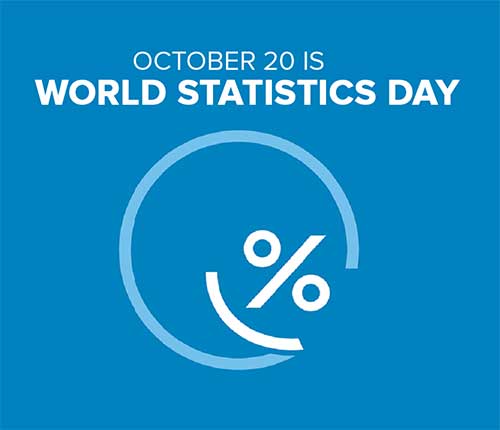
World Statistics Day is a global event celebrated every five years on October 20th. It aims to raise awareness about the importance of reliable, timely, and accurate statistical data in decision-making. It highlights the role of statistics in improving people's lives worldwide and emphasizes how data-driven insights can help address critical challenges in health, education, economics, and beyond.
The celebration of this day showcases the essential role that statistics play in shaping policies, supporting sustainable development, and driving innovation in all areas of society. This article delves into the significance of #WorldStatisticsDay, its history, and how statistics contribute to building a better world.
The History of World Statistics Day
The first World Statistics Day was celebrated in 2010 after being officially established by the United Nations General Assembly. It is recognized every five years, with the most recent celebration in 2020 under the theme "Connecting the world with data we can trust." The day highlights the global need for high-quality #TrustedData that can inform decision-makers in both public and private sectors.
The initiative aims to recognize the achievements of statistical offices worldwide in collecting, analyzing, and disseminating data that helps us better understand societal trends and improve public services.
Why Statistics Matter in Everyday Life
Statistics often touch every aspect of our daily lives without us realizing it. From the inflation rates that influence economic policies to health statistics that shape public health strategies, data is used to monitor progress and implement changes. Here are some of the critical areas where statistics play a vital role:
1. Economic Planning and Development
Governments and businesses rely heavily on economic data such as gross domestic product (GDP), unemployment rates, and consumer spending patterns to make informed decisions. Reliable statistics help policymakers design effective economic policies that promote growth, address inequality, and stabilize the economy.
2. Health and Public Welfare
Statistical data is fundamental to public health initiatives. During the COVID-19 pandemic, for instance, data on infection rates, mortality, and vaccine distribution played a critical role in shaping response strategies. Similarly, health statistics guide policies on disease prevention, healthcare access, and patient outcomes.
For example, the World Health Organization (WHO) uses health statistics to monitor global health trends and identify areas for improvement, helping direct resources more effectively to fight diseases and improve public health.
3. Education and Employment
Data helps track student performance, assess teacher effectiveness, and monitor access to learning resources in education. Employment statistics measure job growth, workforce trends, and labor market inequalities, giving policymakers tools to develop job creation programs and training initiatives.
Statistics also provide critical insights into gender disparities in various fields. On World Menopause Day, Empowering Women Through Education and Awareness, educational campaigns rely on statistical data to address gender-specific health issues and advocate for better resources and awareness for women.
Sustainable Development Goals and the Role of Data
Statistics are vital to achieving the United Nations Sustainable Development Goals (SDGs), a global initiative aimed at eradicating poverty, promoting education, ensuring gender equality, and addressing climate change. Accurate and comprehensive data collection helps track progress toward these goals and allows for the adjustment of policies to ensure no one is left behind.
For example, data on poverty levels helps identify where aid and social services are needed most. Environmental statistics provide crucial information for creating sustainable policies to reduce pollution and promote renewable energy sources.
Organizations like the United Nations Statistics Division (UNSD) work with countries worldwide to improve their statistical systems and ensure that governments have the information they need to make informed decisions supporting sustainable development.
Building Trust in Data
The 2020 World Statistics Day theme, "Connecting the world with data we can trust," underscores the importance of trust in the data we rely on. Inaccurate or manipulated data can have serious consequences, leading to poor decision-making, resource misallocation, and a loss of public trust.
Professional statistical organizations are committed to transparency, quality, and integrity in data collection and reporting. National statistics offices worldwide follow rigorous international standards to ensure data is reliable, comparable, and usable across different contexts. Ensuring data accuracy is crucial in building trust and fostering evidence-based decision-making.
The Future of Statistics
As technology advances, so does the field of statistics. Innovations in data science, machine learning, and artificial intelligence (AI) are revolutionizing how we collect, analyze, and interpret data. Big data transforms industries, enabling more precise forecasting, personalized healthcare, and smarter cities.
However, with the increasing availability of data, there is also a need for responsible data use. Privacy concerns and ethical considerations are becoming more prominent, especially as more personal data is collected through digital platforms. Balancing innovation with privacy protection will be a crucial challenge for statisticians in the future.
Get Involved in World Statistics Day
There are several ways to get involved in World Statistics Day and contribute to the growing awareness of the importance of data. Here are some ideas:
1. Share Data Insights
You can use social media to share interesting data points and statistics that highlight the value of data in everyday life. Educate others about the role of statistics in improving health, education, and economic outcomes.
2. Participate in Educational Webinars
Many national statistical offices and international organizations host events, webinars, and talks to celebrate World Statistics Day. These events focus on the value of data and the latest innovations in statistics.
3. Support Open Data Initiatives
Support initiatives that promote open access to data, allowing more individuals, organizations, and governments to use data for research, planning, and innovation. Open data platforms encourage transparency and collaboration, essential to building trust in statistical systems.
Conclusion
World Statistics Day reminds us of data's fundamental role in shaping our world. Statistics drive progress, inform policy, and help solve global challenges, from improving public health to promoting sustainable development. By celebrating this day, we acknowledge the importance of trusted data in building a better future.
As we recognize the power of data, let's also not forget the importance of other global awareness days, such as World Menopause Day Empowering Women Through Education and Awareness, which emphasizes the need for education and understanding of critical health issues.
FAQs
1. When is World Statistics Day celebrated?
World Statistics Day is observed every five years on October 20th.
2. Why is statistical data meaningful?
Statistical data is essential for informed health, education, economic planning, and sustainable development decision-making.
3. How do statistics contribute to sustainable development goals?
Statistics help monitor progress toward the United Nations Sustainable Development Goals by providing insights into poverty, education, environmental protection, and more.
4. What is the theme of the latest World Statistics Day?
The 2020 World Statistics Day theme was "Connecting the world with data we can trust."
5. How can I get involved in World Statistics Day?
You can participate by sharing data insights on social media, attending educational events, or supporting open data initiatives to raise awareness about the value of trusted data.



